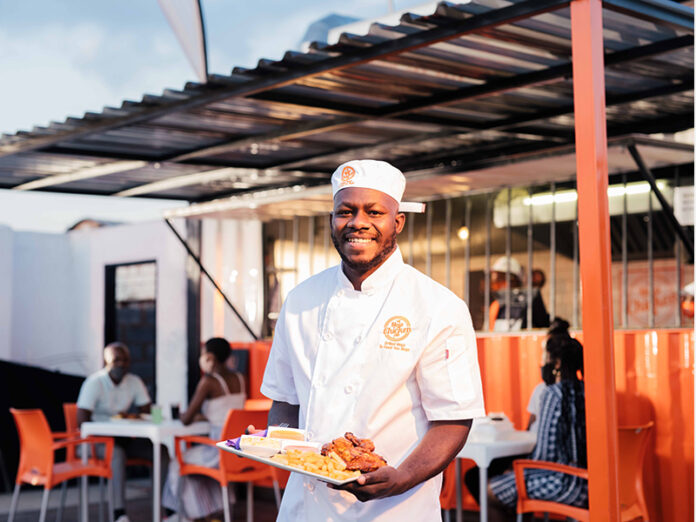When the hard lockdown in March 2020 closed his Soweto chicken restaurant after just six months of operation, Letlhogonolo Motseeng gave away all his stock to stop it from spoiling, gave up his flat and sold much of his furniture. Homeless, he slept in his car for several weeks to keep his business running and continue paying his staff.
When it got to the point where he also had to sell his car, it was “a pain”, he says, “but I had to rescue the business”.
Motseeng knows something about resilience and entrepreneurship. He started selling sweets at school at the age of 11 to help support his family. After matric he sold chicken feet and gizzards outside shebeens.
“I had to come up with a solution… I had to be more creative to address the market and serve its needs.”
When he came up with his Moja Chicken restaurant concept years later, centred around eateries set up in moveable shipping containers with rooftops and targeting the township market, he based it on what he knew.
“When I was growing up, the only meat we ever ate was chicken. My late grandmother owned chickens and it was my responsibility to feed them. Also, chicken is the most-consumed meat product in South Africa. I saw an opportunity there,” he says.
According to a COVID-19 impact report published in late 2020 by Finfind and key national partners, an inability to operate was one of the factors forcing the closure of almost 43% of 1 489 South African SMMEs surveyed during the first five months of the pandemic. But giving up was never an option for Motseeng. He had, after all, quit his comfortable nine-to-five job to use the capital for his new enterprise.
“I had to come up with a solution… I had to be more creative to address the market and serve its needs,” he recalls. So, once eateries were allowed to open for takeaways, he introduced a food delivery and collection model into the business and stepped up his marketing efforts.
He initially struggled to cope with just one delivery bike, but persevered, later buying two more bikes and eventually renting a couple more.
His determination paid off. Several lockdown levels and three waves of the pandemic later, his original Soweto outlet and franchises were thriving.
One of the things that drives him is empowering young people, he stresses. “Every time I open a new store, I’m excited about creating jobs.”
His concept, vision and spirit of innovation also earned Letlhogonolo Motseeng a place among 12 SMMEs supported by insurer Hollard’s Big Ads for Small Business initiative that aims to help small, medium and micro-enterprises thrive, to their own benefit and that of their communities and the broader economy.




